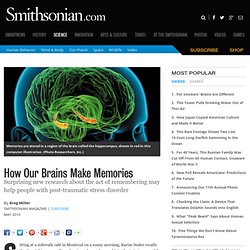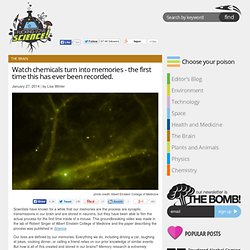

Environmental Sociology The Fundamental Problem with Humankind's Ideologies of Nature Jeremy Chapman Montreal Linux Computer Consultant. Language words & phrases Talking Climate. Adaptation_language_alternatives. Language and opinion Framing climate change The Economist. Climate change, through the language of the arts University of Colorado Boulder. Theory and language of climate change communication - Nerlich - 2009 - Wiley Interdisciplinary Reviews Climate Change - Wiley Online Library.
S_H_Calel. Do corporate global environmental standards create or destroy market value. Ecosystem Markets Task Force - Defra. Bjos12025. How Our Brains Make Memories. Sitting at a sidewalk café in Montreal on a sunny morning, Karim Nader recalls the day eight years earlier when two planes slammed into the twin towers of the World Trade Center.

He lights a cigarette and waves his hands in the air to sketch the scene. At the time of the attack, Nader was a postdoctoral researcher at New York University. He flipped the radio on while getting ready to go to work and heard the banter of the morning disc jockeys turn panicky as they related the events unfolding in Lower Manhattan. Nader ran to the roof of his apartment building, where he had a view of the towers less than two miles away.
Watch chemicals turn into memories - the first time this has ever been recorded. Scientists have known for a while that our memories are the process are synaptic transmissions in our brain and are stored in neurons, but they have been able to film the actual process for the first time inside of a mouse.

This groundbreaking video was made in the lab of Robert Singer of Albert Einstein College of Medicine and the paper describing the process was published in Science. Our lives are defined by our memories. Everything we do, including driving a car, laughing at jokes, cooking dinner, or calling a friend relies on our prior knowledge of similar events. But how is all of this created and stored in our brains? Traumamemory.